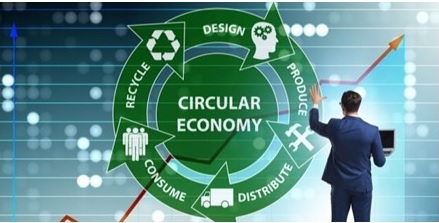 Have you heard about the circular economy or the doughnut economy? It was the focus of the Horsham Climate Cafe presentation on Saturday 6th February 2021. The speaker, an expert in the circular economy, Peter Desmond from Rethink Global and founder of Fairer World Lindfield. Peter is also a fellow Climate Reality Leader – Peter and his wife Chris trained in Atlanta March 2019, I trained in Manila in 2016. Peter’s talk was packed with ideas and inspiration for addressing the climate and ecological crisis through following this logical business model.
Have you heard about the circular economy or the doughnut economy? It was the focus of the Horsham Climate Cafe presentation on Saturday 6th February 2021. The speaker, an expert in the circular economy, Peter Desmond from Rethink Global and founder of Fairer World Lindfield. Peter is also a fellow Climate Reality Leader – Peter and his wife Chris trained in Atlanta March 2019, I trained in Manila in 2016. Peter’s talk was packed with ideas and inspiration for addressing the climate and ecological crisis through following this logical business model.
Although our climate cafe is called the ‘HORSHAM Climate Cafe which is on the first Saturday of every month always draws attendees from all over the world. This online event was attended by people from Burgess Hill, Steyning, Lindfield, Billingshursth, Lewes, Gosport, Crowborough, Crawley, Worthing, Horsham of course, Hertfordshire, London and Italy. Our monthly climate café is successfully connecting isolated individuals alongside people who are leading or part of groups, this Saturday included Friends of the Earth, Climate Action Networks, Extinction Rebellion, Transition, Greening Groups, Repair Cafes, United Kingdom Without Incineration Network and United Nation Association Climate & Oceans. Many, like us are active members of the South East Climate Alliance.
You can listen to Peter’s presentation podcast and see his slides below. Read on to learn more from our West Sussex County Times Sussex Green Living weekly column which was published on 28th January and written by Morag Warrack.
Call to shift focus from GDP to help Horsham people contribute to healthy community
Simon Kuznets invented the concept of GDP (Gross Domestic Product) almost a hundred years ago, during the Great Depression.
His intention was simply to help the US government understand the global crisis by following the rise and fall in the finances of the nations. He warned against the misuse of this data, writing: “The welfare of a nation can scarcely be inferred from a measure of national income.”
When ‘economy’ passes the point of usefully contributing to welfare and simply becomes ‘making’ money for its own sake, does it cease to become true economy in the original Greek sense of ‘good household management’, where ‘eco-’ means ‘home’?
Are we merely buying an idea?
During the global financial crash of 2008, governments finally began looking for alternatives to GDP as their chosen measure of ‘progress’. The nation of Bhutan led the way by measuring its Gross National Happiness (GNH).
France followed in 2009, commissioning a report using wellbeing, not GDP, as a measure of progress; in 2010, the UK also began measuring objective welfare alongside reported happiness. Then in 2012, the United Nations produced the World Happiness Report, a ‘holistic approach to development’.
Our economy depends upon low or unpaid caring work such as raising children and caring for the elderly and sick, but its monetary value is overlooked. ‘Care’ and the value of ‘natural assets’ is paradoxically neglected by economics, although they are fundamentals of our wellbeing.
And where does our Government’s focus on continual GDP growth lead us? As the rich become richer while the poor become poorer, our GDP can still look just great! It tells us little about the distribution of wealth across households.
Striving for unlimited growth is clearly impossible because of Earth’s limited resources, but Governments prefer generally to think ahead only a few years. We have never had to deal with problems of the scale facing today’s globally interconnected society. Where will they have taken us in the next few generations?
“What we need are economies that enable us to thrive, whether or not they grow”, says Kate Raworth in her book, Doughnut Economics. To support Horsham folk in being able to contribute to a healthy community where people feel valued and proud and have a sense of ownership, GDP ‘growth’ will have to stop being the sole focus of attention.
These next years call for balanced economic thinking where the effects of our production and consumption on the planet are measured. It calls for decisions that focus on sustainability, because our habit of buying more than we need and throwing it away is costing us the Earth.
You can learn about our forthcoming Horsham Climate Cafe and Horsham Future Forum online meetings here.
Peter Desmond MA(Oxon) MA FCA MBA FRSA
www.circulareconomyclub.com and www.ceinstitute.org
View the presentation or listen to Peter Desmond’s circular economy presenatation at the Horsham Climate Cafe below.
View Peter’s presentation slides by clicking on the image above.
Feeling inspired to get involved?
We are always looking for volunteers, so get in touch or come and meet us and see how you can get involved! Join us on Facebook, Twitter and Instagram, or sign up to receive our latest news (it only takes two seconds to add your email address – simply click on black ‘Follow‘ tab on bottom right of this screen!). Feel free to also send us an email using our contact form, or come and say hello at our events like the Horsham Climate Cafe or the Horsham Repair Cafe!








